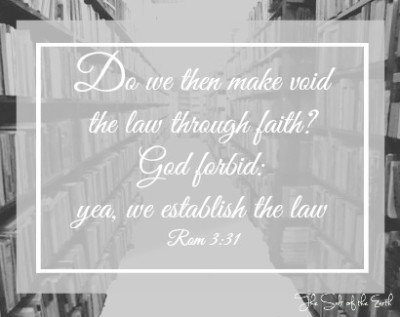In the modern gospel, many Scriptures are taken out of context and adjusted to the will and the lusts and desires of the flesh, so that the carnal man doesn’t have to change, but can stay the way (s)he is and live the way (s)he wants, and persevere in sin without feeling guilty and without any consequences. Intando kaNkulunkulu, which has been made known through the Scriptures, especially the moral part of the law, is rejected and everything that God has disapproved and condemned in the Bible is considered outdated, legalistic, and no longer applies today. People say that sin has been made of no effect and that sin has no consequences, since we no longer live under the law but under grace. But did sin come by the law and does sin no longer exist and have no consequences, because Christ has freed us from the law? Or did sin already exist before the law and does sin still exist and still have consequences, despite the redemption in Christ from the law?
The Creator of heaven and earth
The grass withereth, the flower fadeth: but the word of our God shall stand for ever (Isaya 40:8)
God is the Creator wezulu nomhlaba nakho konke okungaphakathi. God is the Almighty, the Eternal, and His will and His words stand forever and shall always apply in the heavens and on earth. No matter what people say and do, people are not able to change the will of God and His Word (Oh. Amahubo 33:11, 1 UPetru 1:25).
The devil can blind the carnal people and tempt them with his lies, which looks like the words of God, but slightly deviate, and make the people believe that God is a modern God, Who moves with the times and because of that adjust His will to the times, but the born again believers, who walk after the Spirit and know the Word and the Father shall not be blinded and be misled but shall know that the will of God shall never change but shall stand forever.
They know the Word and they know that eventually, His Word shall judge everyone according to his or her works. No one is excluded from the judgment of God (IsAmbulo 20:12 (Funda futhi: ‘The Word has the final word on the Day of Judgment‘).
God made His will known to mankind
From the creation, God made His will known to mankind. Man was perfectly created in the umfanekiso kaNkulunkulu and didn’t have a sin nature, but man had a free will. This free will of mankind chose to rebel against the words of God and to leave the only commandment of God.
 Man believed and obeyed the creation instead of the Creator and bowed before the creation and put the creation above the Creator, causing mankind to come under the authority of the creation; usathane.
Man believed and obeyed the creation instead of the Creator and bowed before the creation and put the creation above the Creator, causing mankind to come under the authority of the creation; usathane.
Kusukela ngaleso sikhathi, because of Adam’s sin, sin entered the whole human race and death reigned in man.
But although the spirit of man died, and sin and death reigned in the flesh of man, man had a conscience of good and evil and a free will to chose between good and evil (Genesis 3:22).
Sin already existed before the law
For until the law sin was in the world: but sin is not imputed when there is no law (AmaRoma 5:13)
Man could choose to walk in righteousness and do good or to walk in iniquity and sin and do evil (Funda futhi: ‘What is sin?‘).
Sin did not come through the law of sin and death, because sin already existed before the law of sin and death, since the law of God already existed before the foundation of the heaven and the earth.
Before the law existed, Cain brought a curse over his life, through his disobedience to the words of God and his evil act.
The flood and the destruction of Sodom, and Gomorrah and the cities around, happened before the law of sin and death existed, because of the evil and disobedience of the people to God.
Sin, which is rebellion of man against God and disobedience to God, already existed before the law and the punishment of sin, okungukufa, also existed before the law. Through disobedience to God, the people brought mischief upon their lives (Funda futhi: ‘Abantu ababi bazilethela bona‘).
God made sin known by the law
Sothini-ke? Is the law sin? UNkulunkulu makakwenqabele. Nay, I had not known sin, but by the law: for I had not known lust, except the law had said, Thou shalt not covet (AmaRoma 7:7)
Sin didn’t come by the law, but sin already existed before the law. And death also reigned before the law. God’s will was already known before the law, since man had a conscience; a knowledge of good and evil. Therefore before the law came into existence, man had the ability to choose to do good or to do evil.
 The only thing that God has done, is that by giving the law of sin and death to His carnal people, abazalwa benzalo kaJakobe (Israyeli), God made His will known to His carnal people.
The only thing that God has done, is that by giving the law of sin and death to His carnal people, abazalwa benzalo kaJakobe (Israyeli), God made His will known to His carnal people.
The law has been added and by giving the law, God showed His nature and His righteousness and revealed sin (AmaRoma 3:20).
Ngenxa yalokho, God’s people knew the will of God and knew exactly what God liked and what God disliked and they were aware of the consequences.
God didn’t give the law as a punishment, but God gave the law out of love for His people and as a schoolteacher, to guide His people until the coming of Jesus Christ, so that His people would walk in His will and His ways.
And those, who belonged to God’s carnal people could show God their love through their obedience to the words of the law of sin and death (Funda futhi: ‘The secret of the law’).
Does the law still apply today?
O wretched man that I am! who shall deliver me from the body of this death? I thank God through Jesus Christ our Lord. So then with the mind I myself serve the law of God; but with the flesh the law of sin (AmaRoma 7:24-25)
There is often a lack of clarity about the law of sin and death and whether this law still applies. The law of sin and death was meant for God’s carnal people, in whom sin and death reigned in the flesh. As written before, the law was a schoolteacher for the flesh until the coming of Jesus Christ, who redeemed fallen man from the power of sin and death by the redemption of the flesh and restored the state of fallen man by the resurrection of the spirit from the dead.
 The only way to be redeemed from the law of sin and death is through faith in Jesus Christ and the death of the flesh and the resurrection of the spirit from the dead (Funda futhi: ‘Kusho ukuthini ukusoka kuKristu?).
The only way to be redeemed from the law of sin and death is through faith in Jesus Christ and the death of the flesh and the resurrection of the spirit from the dead (Funda futhi: ‘Kusho ukuthini ukusoka kuKristu?).
Ngakho-ke akusekho ukulahlwa kwabakuKristu Jesu, abangahambi ngokwenyama, kodwa ngoMoya. Ngokuba umthetho kaMoya wokuphila kuKristu Jesu ungikhululile emthethweni wesono nokufa (AmaRoma 8:1-2)
Ngokuvuselela, the law of sin and death, which reigns in the flesh’, no longer applies, since the flesh is death.
Through the crucifixion of the flesh and the resurrection of the spirit from the death and the indwelling of the Holy Spirit, the law of sin and death no longer reigns in the life of the new man, but the law of the Spirit reigns in the life of the new man, which is written in the new heart of the new man. Death no longer reigns through the flesh, but life reigns through the Spirit (Funda futhi: ‘Kungani uNkulunkulu waloba umthetho wakhe ezibhebheni zamatshe?‘ And ‘Kwenzenjani 50 days after Pascha?‘)
The new man loves God above all and everyone
The new man, in whom the law of the Spirit reigns, walks by faith after the will of God and loves God above all and everyone and fears God and submits himself or herself to God. From that love, the new man loves his or her neighbor as him or herself.
Lokhu kusho, phakathi kwabanye, lokho (s)he shall serve no other gods and shall not allow other gods in his or her life and shall not follow human amafilosofi, theories and izimfundiso zamanga and strange religions and not get involved in the occult realm and connect himself or herself with death (Funda futhi: ‘The two ways to enter the spiritual realm‘ and ‘What does the Word say about tattoos?')
 It means, lokho (s)he shall honor his or her parents and shall not lie against his or her neighbor and shall not covet his or her possessions. (S)he shall not commit fornication, ukuphinga, not be intimate with someone, who isn’t his or her spouse, not be intimate with someone of the same gender, hhayi isehlukaniso, bulala, ukweba, curse, use the Name of God in vain, njalo njalo.
It means, lokho (s)he shall honor his or her parents and shall not lie against his or her neighbor and shall not covet his or her possessions. (S)he shall not commit fornication, ukuphinga, not be intimate with someone, who isn’t his or her spouse, not be intimate with someone of the same gender, hhayi isehlukaniso, bulala, ukweba, curse, use the Name of God in vain, njalo njalo.
Because these are all works of the flesh, in which sin and death reigns. The works of the flesh go against the will of God and don’t produce life, but death.
As long as people persevere in sin and refuse to repent and put off the works of the flesh, death shall reign through sin.
If the law derived from God’s nature and represents God’s will and His nature, then the new man, who is born of God and has God’s nature shall do the will of God and establish the law, njengoJesu (Funda futhi: ‘How do you establish the law?’)
Sin still exists
Do we then make void the law through faith? UNkulunkulu makakwenqabele: yebo, we establish the law (AmaRoma 3:31)
Sin already existed before the law and sin still exists, despite the grace of God and freedom from the law through the redemptive work of Jesus Christ. Abantu, who live in the New Covenant still have the ability to obey God’s Word and walk in righteousness or to disobey God’s Word and walk in iniquity.
 Labo, who say that sin no longer exists, because you have been made free from the law and that it doesn’t matter how you life, are liars and don’t speak the truth. Because to God, it does matter how you live (Funda futhi: ‘Once saved always saved?).
Labo, who say that sin no longer exists, because you have been made free from the law and that it doesn’t matter how you life, are liars and don’t speak the truth. Because to God, it does matter how you live (Funda futhi: ‘Once saved always saved?).
Labo, who say these things don’t have the Spirit of God and don’t belong to Him. They don’t have a personal relationship with Jesus Christ and the Father and don’t know the will of God.
They are not familiar with the things of the Kingdom of God, but they are unspiritual and blinded by the lies of the devil.
God has given everyone the ability to be redeemed from the power of sin and death, through Jesus Christ and His redemptive work.
He has given power to everyone, to become a son of God, by faith in Jesus Christ and ukuvuselelwa kuye, and to walk after the Spirit, and by the Spirit put off the works of the flesh (UJohane 1:12-13).
The blood of Jesus cleanses from all sin and redeems man from the power of sin and death
Sothini-ke? Siqhubeke esonweni, ukuze umusa wavame? UNkulunkulu makakwenqabele. Sizokwenza kanjani, abafile esonweni, hlalani nisaba khona? Anazi nina, ukuthi sonke esabhabhathizelwa kuKristu Jesu, sabhabhathizelwa ekufeni kwakhe? Ngakho-ke sembelwa kanye naye ngokubhapathizelwa ekufeni: ukuthi njengalokhu uKristu wavuswa kwabafileyo ngenkazimulo kaYise, kanjalo nathi kufanele sihambe ekuphileni okusha (AmaRoma 6:1-4)
Nsuku zonke, everyone makes a choice to live in obedience to God and His Word or not. The blood of Jesus Christ and His redemptive work doesn’t change that. The blood of Jesus is not a permit to persevere in sin and keep doing those things, which go against the will of God and are an abomination to God.
 Yini-ke? sizokona yini, ngoba kasikho ngaphansi komthetho, kodwa ngaphansi komusa? UNkulunkulu makakwenqabele. Anazi nina, ukuthi enizinikela kuye ukuba yizigqila zokumlalela, niyizinceku zakhe enimlalelayo; noma owesono kube ngukufa, kumbe elokulalela kube ngukulunga? Kodwa uNkulunkulu makabongwe, ukuthi laliyizinceku zesono, kodwa nilalele ngenhliziyo leyo ndlela yesifundiso enanikelwa yona. Ukukhululwa ke esonweni, nibe yizinceku zokulunga (AmaRoma 6:15-18)
Yini-ke? sizokona yini, ngoba kasikho ngaphansi komthetho, kodwa ngaphansi komusa? UNkulunkulu makakwenqabele. Anazi nina, ukuthi enizinikela kuye ukuba yizigqila zokumlalela, niyizinceku zakhe enimlalelayo; noma owesono kube ngukufa, kumbe elokulalela kube ngukulunga? Kodwa uNkulunkulu makabongwe, ukuthi laliyizinceku zesono, kodwa nilalele ngenhliziyo leyo ndlela yesifundiso enanikelwa yona. Ukukhululwa ke esonweni, nibe yizinceku zokulunga (AmaRoma 6:15-18)
When someone perseveres in sin and is not willing to repent, it proves that the sin nature still reigns in that person’s life and the person still loves the works of the flesh (isono).
The person is not born again, kodwa kuseyindalo endala, who walks after the flesh and lives as a slave of sin and death and belongs to the devil and the world.
God’s will shall never change and shall never adapt to the times we live in, nor to the lusts and desires of the flesh of mankind (Funda futhi: ‘Shall God change His will to the lusts and desires of man?‘).
God is the same and remains the same from eternity to eternity and therefore His will remains the same. It’s up to the people, to submit to God and obey His words and live after His will or not.
‘Yiba usawoti womhlaba’


